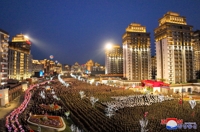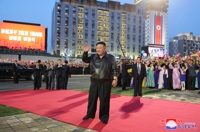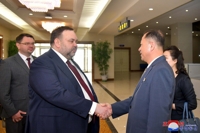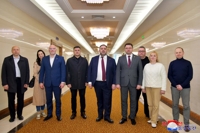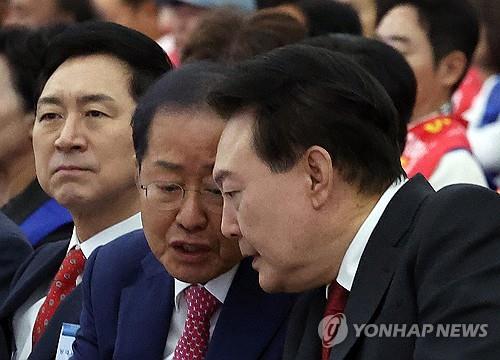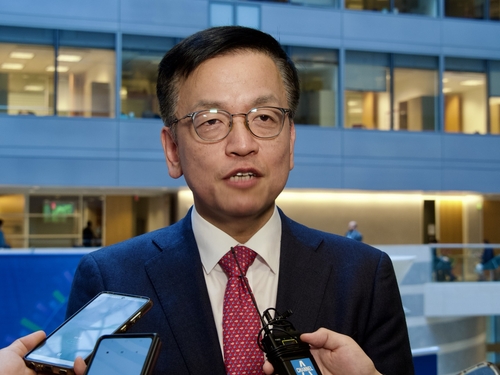S. Korea vice FM urges N.K. to improve 'horrific' human rights conditions
GENEVA, March 3 (Yonhap) -- South Korea's vice foreign minister on Tuesday called on North Korea to take concrete and sincere steps to improve its "horrific" human rights situation, saying that Pyongyang should not ignore the plight of its own people any longer.
The call made by Cho Tae-yul came as he and North Korean Foreign Minister Ri Su-yong attended the high-level segment of the 28th session of the United Nations Human Rights Council that kicked off a four-day run in Geneva on Monday.
Cho said in a keynote speech that North Korea should not continue to trample on the human rights of its own people, saying that the North's move to conceal the truth cannot be successful.
"We hope the DPRK will no longer ignore the plight of its own people. We call on the DPRK to immediately take concrete and sincere steps so that its people can carry on a normal, dignified life," Cho said. The DPRK stands for North Korea's official name, Democratic People's Republic of Korea.
North Korea's human rights issue has received grave attention since last year as the U.N. General Assembly in December adopted a landmark resolution that calls for the Security Council to refer the North to the International Criminal Court for rights violations.
The U.N. Commission of Inquiry (COI) unveiled its report last year that accused Pyongyang of "systematic, widespread and grave violations of human rights."
This year's U.N. meeting came amid keen attention as North Korea's top diplomat delivered a speech earlier in the day, the first of its kind, in a bid to vindicate Pyongyang's stance over its rights records.
North Korea has insisted that the U.N. resolution should be nullified as it was written based on what it claimed was a false testimony by a North Korean defector. Recently, North Korean defector Shin Dong-hyuk has confessed that he lied about some facts about his survival in North Korean political prison camps.
Touching on Ri's speech, Cho said that he felt "an overwhelming sense of sorrowful pity" as the North's minister tried to cover up the truth even though he is the very person who is well aware of Pyongyang's dismal rights condition.
"He exploited a refugee's confession about changes in his account in an attempt to conceal the truth, a pitiful effort born out of desperation indeed," Cho said. "One cannot veil the sky with the palm of a hand. Darkness can never defeat light."
He also called on the global community not to repatriate North Korean asylum seekers against their wills and to provide them with proper protection and assistance.
With regard to the issue of Japan's wartime sex slavery, Cho called on Tokyo to face up to history and "act in response with accountability" so that surviving victims can restore their dignity in their lifetime.
"Genuine efforts by the Japanese government to resolve this thorny issue will pave the way for Korea and Japan to build a new future of co-prosperity," Cho said.
The sex slavery issue has been the main source of tension between Seoul and Tokyo at a time when this year marks the 50th anniversary of normalization of their diplomatic ties. The year also marks the 70th anniversary of Seoul's liberation from Tokyo's 1910-45 colonial rule.
Historians estimate the number of such sex slaves at about 200,000 in Asia. Currently, 53 Korean victims are alive with their average age standing at near 90.
"We urge the Japanese government to assume a more sincere and courageous stance at the ongoing bilateral consultations to come up with a solution that is acceptable to the victims and the international community."
In April, the two historical rivals launched the talks on the sex slavery issue, but there has been little progress as Japan has denied its past wrongdoings.
South Korea has demanded that Japan show sincerity by settling the sex slave issue "in a way that is agreeable to the living victims," including through a sincere apology and compensation.
Japan has long dismissed Seoul's demands, claiming that all grievances related to its colonial rule of the Korean Peninsula were settled through a 1965 treaty that normalized their ties.
sooyeon@yna.co.kr
(END)
-
 Defense chief says N. Korea's hypersonic missile 'unsuccessful' in last-stage glide flight
Defense chief says N. Korea's hypersonic missile 'unsuccessful' in last-stage glide flight -
 Relax, immerse yourself in scents at Venice Biennale's Korean Pavilion
Relax, immerse yourself in scents at Venice Biennale's Korean Pavilion -
 Overdue debut of Korean abstract art pioneer Yoo Young-kuk at Venice Biennale
Overdue debut of Korean abstract art pioneer Yoo Young-kuk at Venice Biennale -
 N. Korea has capability to genetically engineer biological military products: U.S. report
N. Korea has capability to genetically engineer biological military products: U.S. report -
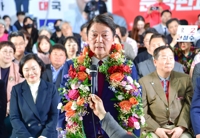 PPP lawmaker says entire Cabinet should resign over general elections defeat
PPP lawmaker says entire Cabinet should resign over general elections defeat
-
 Relax, immerse yourself in scents at Venice Biennale's Korean Pavilion
Relax, immerse yourself in scents at Venice Biennale's Korean Pavilion -
 Overdue debut of Korean abstract art pioneer Yoo Young-kuk at Venice Biennale
Overdue debut of Korean abstract art pioneer Yoo Young-kuk at Venice Biennale -
 Defense chief says N. Korea's hypersonic missile 'unsuccessful' in last-stage glide flight
Defense chief says N. Korea's hypersonic missile 'unsuccessful' in last-stage glide flight -
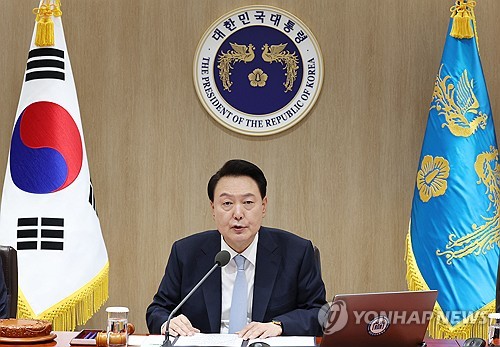 (LEAD) Yoon vows to improve communication with people after election defeat
(LEAD) Yoon vows to improve communication with people after election defeat -
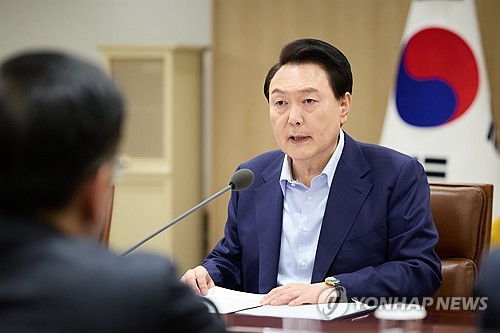 Yoon presides over emergency meeting on Mideast crisis
Yoon presides over emergency meeting on Mideast crisis
-
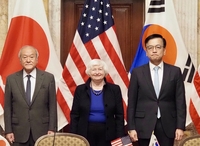 (4th LD) Finance chiefs of S. Korea, U.S., Japan recognize 'serious' concerns over 'sharp' won, yen depreciation
(4th LD) Finance chiefs of S. Korea, U.S., Japan recognize 'serious' concerns over 'sharp' won, yen depreciation -
 S. Korea to provide 100,000 tons of rice to 11 nations
S. Korea to provide 100,000 tons of rice to 11 nations -
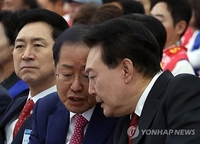 Yoon, Daegu mayor met to discuss post-election matters: sources
Yoon, Daegu mayor met to discuss post-election matters: sources -
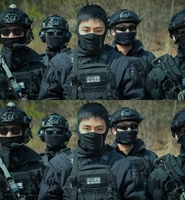 Facebook page unveils photos of BTS member V in counter-terrorism unit gear
Facebook page unveils photos of BTS member V in counter-terrorism unit gear -
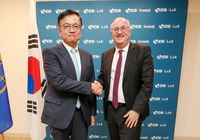 S. Korea to provide US$200 million in humanitarian aid to Ukraine this year
S. Korea to provide US$200 million in humanitarian aid to Ukraine this year















